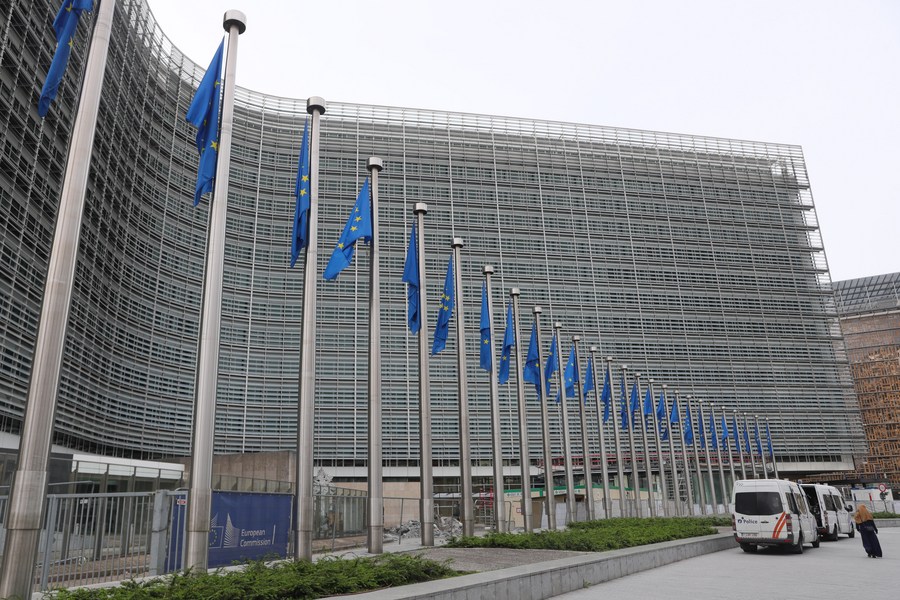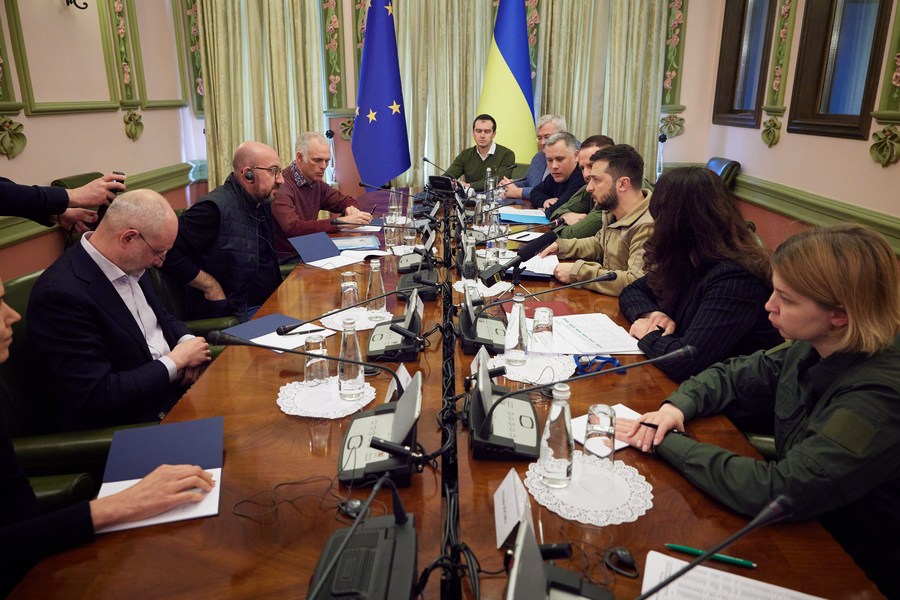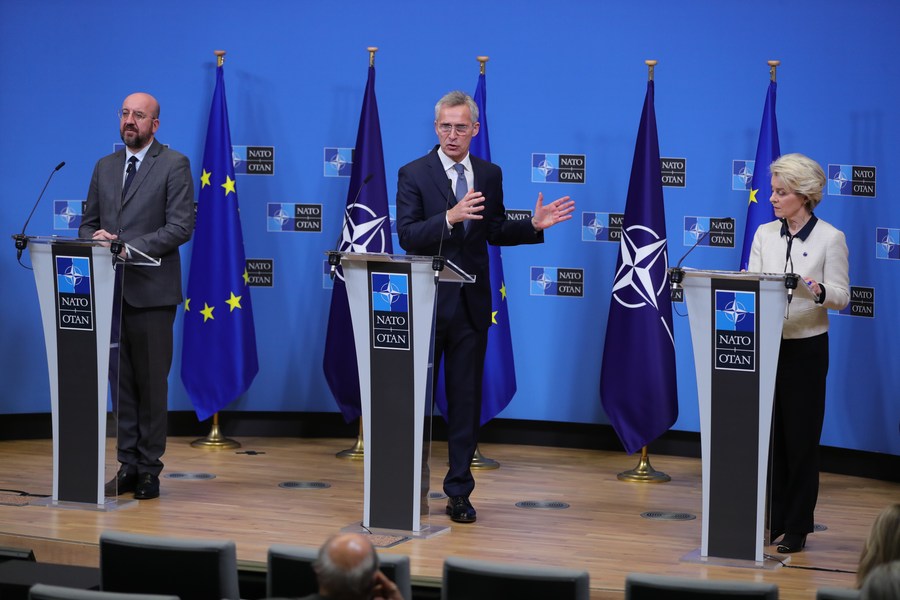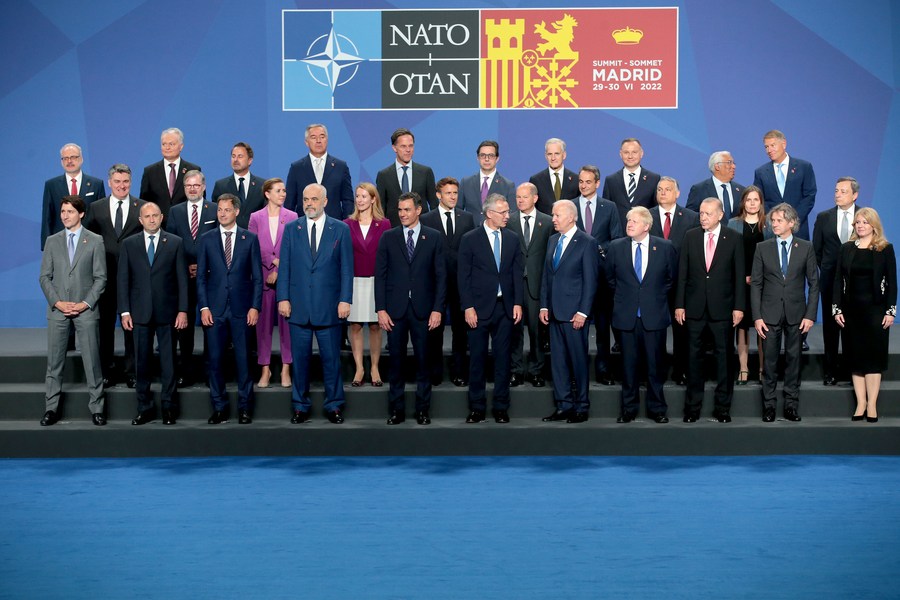
A woman walks past the European Commission headquarters at the European Quarter in Brussels, Belgium, July 19, 2020. (Xinhua/Zheng Huansong)
The EU has been supporting Ukraine as well but analysts say it is clear the United States has taken the leading role.
ROME, Feb. 23 (Xinhua) — The conflict in Ukraine has brought the decades-old issue of the European Union’s (EU) strategic autonomy back into the spotlight, according to analysts.
In many ways, the United States has been a leader in setting policies that have backed the Ukrainian cause, with European countries largely following its steps.
Ukraine has benefited from strong support from the EU as well. But analysts say it is clear the United States has taken the leading role.
“The powers the EU has in regard to foreign policy and security policy are very limited compared to the powers it has in other policy areas,” Mattia Guidi, a political scientist at Rome’s LUISS University, told Xinhua.
He says there are multiple reasons for that, including the depth of the influence of the United States and the way geopolitical issues are decided in Europe.
“The EU makes decisions based on a unanimity rule, which means that it is necessary to put all 27 member states around a table and find a solution that fits everyone,” Guidi said. “That is very difficult. What usually happens is that with foreign and security policy, the European Union can’t decide anything substantial.”

European Council President Charles Michel (2nd L) meets with Ukrainian President Volodymyr Zelensky (3rd R) in Kiev, Ukraine, April 20, 2022. (Ukrainian Presidential Office/Handout via Xinhua)
That was the case earlier this month, when Ukraine’s President Volodymyr Zelensky met with European leaders in Brussels for the European Council summit on Feb. 9.
There was consensus in terms of pledging continued support for Ukraine, but wide differences remained on what that meant: some countries wanted to support Ukraine in possible peace talks, some wanted to limit support to financial mechanisms, and others wanted to continue military support.
There was also criticism from Italy’s Prime Minister Giorgia Meloni that the trilateral talks between Zelensky, French President Emmanuel Macron and German Chancellor Olaf Scholz in Paris one day before the summit were “inappropriate” given the unanimity principle, Guidi said.
Analysts say those issues have increased the influence of the North Atlantic Treaty Organization (NATO), which is now the principal support framework for Ukraine, and one that had already started to support Kiev years before the conflict broke out.
Facing a large-scale conflict at its door, the EU’s capacity is limited in how it could respond. At the same time, NATO has expanded military presence on its eastern flank. Its regular defense ministers’ meeting and the larger Ukraine Defense Contact Group meeting at the U.S. airbase in Ramstein, rather than the EU Council of foreign and defense ministers, now make decisions concerning the conflict.

European Council President Charles Michel (L), NATO Secretary General Jens Stoltenberg (C) and European Commission President Ursula von der Leyen attend a press conference at the NATO headquarters in Brussels, Belgium, Jan. 10, 2023. (Xinhua/Zheng Huansong)
“NATO is already there. It is a more functional organization for managing these issues, and it is where, of course, the United States plays a central role,” Guidi said. “It’s also easy for this shift to take place because there is such a large overlap between NATO and the EU.”
NATO has 30 member states, including 21 EU members. Two more EU member states, Sweden and Finland, are in the process of joining NATO, while multiple non-EU NATO member states are seeking EU membership.
According to Ingo Peters, a foreign policy expert at the Free University of Berlin, the issue of the strategic autonomy of the EU is one that has often come to the surface in the past, since the end of the Cold War in the early 1990s.
“The strategic autonomy of Europe has already been favored by some, but not by all,” Peters, who is currently a visiting scholar at the Center for European Studies at the U.S. University of North Carolina in Chapel Hill, told Xinhua.

Participants of the 2022 Summit of the North Atlantic Treaty Organization (NATO) pose for a group photo in Madrid, Spain, June 29, 2022. (Photo by Juan Carlos Rojas/Xinhua)
“Germany, for example, has always said that the EU should not go forward without the United States, which it has said is something essential to strengthening the European Union,” Peters said.
Germany reportedly agreed to send advanced Leopard 2 tanks to Ukraine in late January only after the United States decided to send M1 Abrams tanks.
“There are historic reasons for this, since we Germans believe there is a need for U.S. influence in Europe as a kind of external balance in order to keep our friends and neighbors calm,” Peters said.
Germany is EU’s largest economy, but Peters noted it has not always been a major player in issues related to international relations and security in part due to its legacy from the two World Wars of the 20th century. But that has begun to evolve in the year since the Ukraine conflict began, Peters said.
“Over the last months, Europe’s strategic autonomy has been given a reality check,” said Ulrike Franke, senior policy fellow at the European Council on Foreign Relations.
“Europe needs to become stronger and more united, less immediately dependent on a United States that is less and less keen to focus its efforts, attention and money on Europe,” Franke said.■
